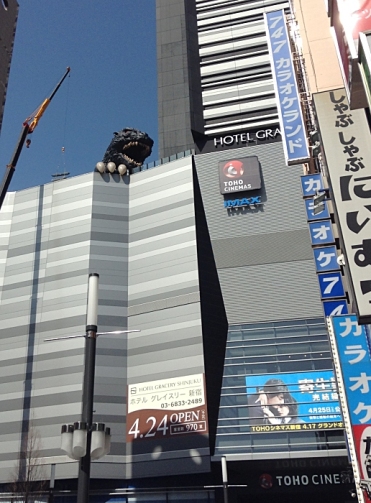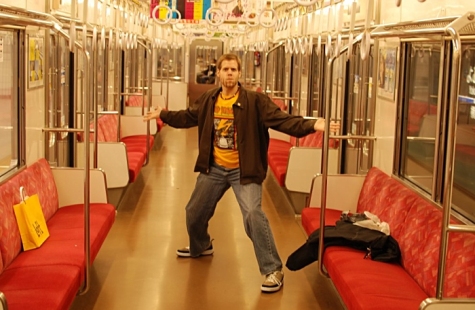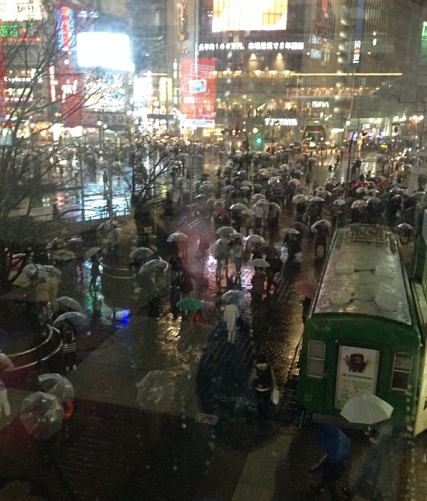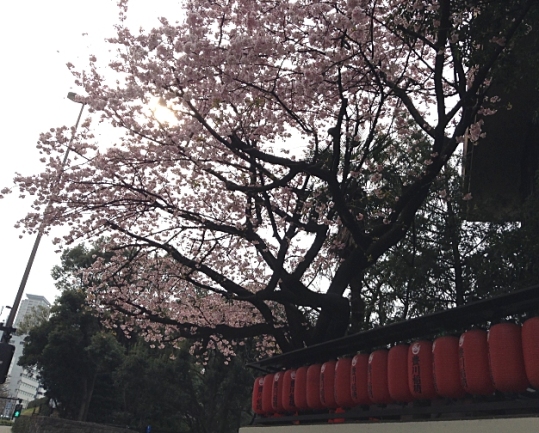***Hey, folks. Modern-day Justin here. It’s time to update this old girl. After all, I’ve now been living in Japan for 16 months. Most of the info holds up, though, so I’ll only make a few changes and additions.
I’ve been to Japan 10 times now. I’ve studied the language pretty intensely for the last two years (thanks to the awesome app, Human Japanese). Japan has become my happy place, and a lot of others are interested in checking it out as well. I couldn’t recommend it more! To help facilitate travel, I’ve put together a cheat-sheet of (hopefully) valuable information and tips, along with several helpful phrases to get you by. Feel free to ask any questions in the comments. Enjoy! 楽しんで下さい!
General
- Don’t forget that you are not only representing yourself, but your nation and your ethnicity. Leave the Japanese people with a good impression of us! Examples: Be wary of speaking too loudly (English to a non-native ear is noise) and be careful of taking pictures that may include/bother those around you. Privacy is treasured.
- The flight(s) will suck. Things that will make flying to/from Japan suck less: plenty of snacks, good headphones (preferably noise-cancelling), an eye mask, toothbrush/toothpaste in your carry-on.
- Jet-lag is legit. Try to get on Japan’s schedule ASAP. Don’t nap after noon the first day, and don’t go to bed before 10:30pm.
- I suggest always having your passport with you. It’s your most important possession.
- Do as much legwork and research as you can before you go. You can’t be too prepared, though I also love wandering around aimlessly.
- When a Japanese person makes an X with their arms or looks like they’re swatting a fly, that means “No.” If you see one of those, maybe stop what you’re doing.
Money
- 1 yen is ~1 cent. That means 100 yen is ~$1. Right now, the dollar is strong, so spend freely!
- Quite a few places don’t take credit cards. And keep in mind most cards charge you a percentage currency-exchange fee per use.
- Don’t count on being able to get cash out of most ATMs. I think you’re safe at convenience stores – 7-11 especially – but I can’t promise anything. Again, there’s a fee per withdrawal so stock up once.
- If you can get yen from your bank before leaving, even better. Sometimes there’s a week or more wait, so don’t procrastinate.
- This is a little new tip but: Bring something to keep your coins in. Coins go up to 500 yen ($5), and 100-yen coins are common. Coin purses can be nabbed at 100-yen stores (Daiso, Lawson 100-yen, etc.).
Getting Around
- Lots of people have at least some understanding of English, and most will help you if asked. Japanese culture in a sense makes your problem their problem.
- There is literally no area of Japan in which I feel unsafe. However, areas like Shibuya and Kabuki-cho can be a little seedy Friday and Saturday nights.
- Subways/train stations are amazingly efficient and have lots of English. If the map you’re looking at is all in Japanese, try the next one over. Also, ticket-buying machines have an English button (usually onscreen).
- Sometimes foot traffic is left; sometimes it’s right. Just go with the flow. As for escalators, in Tokyo you stand left walk right. In Osaka, it’s walk left stand right.
- When you’re going from the airport to your hotel, taking a limo bus is a good option. Trains are cheaper but can get confusing and cramped (and you have luggage).
- There’s a definite rush hour, when quite literally everyone is taking mass transit. Also, night life is usually restricted to Friday and Saturday nights, because everyone busts their ass throughout the week.
- Trains stop around 12:30am. If you’re out later than that, you gotta cab it.
- Cab doors sometimes open automatically. Fewer do these days, but you’ll feel stupid if you try to open an automatic one.
- Do not tip taxi drivers! There is no tipping in Japan; it’s viewed as offensive.
- If you plan on going to several distant cities, look into a Japan Railways (JR) Pass. It will give you unlimited rides for a week for one price.
Hotels
- Many cheaper hotel rooms are VERY SMALL. Be prepared that this isn’t a Motel 6 in Richmond. You will often barely have a spot to stash your suitcase. But rooms are efficient.
- Most staff you’ll interact with speak English.
- Convenience fee is included in your rate, so don’t be shy about asking for help from hotel staff. Do not tip staff!
- I suggest getting very good directions or taking a cab the first time you go to your hotel. I’ve been stuck wandering aimlessly for a long time while schlepping luggage. Not fun.
- I recommend staying at a ryokan for at least one night. These are traditional Japanese lodgings with futon bed, yukata clothing, an insistence on slippers and sometimes a traditional bath tub.
- It’s worth mentioning that hotel breakfasts are weird. Runny eggs and floppy bacon, plus random things like salads and roasted potatoes are just the tip of the iceberg. While even a vegan like me is able to fill up, consider the price if it’s an extra cost.
Restaurants
- Ask for a picture or English menu. If wait staff is on top of things, you won’t even have to ask.
- Quite a few restaurants are cash-only.
- Some sliding restaurant doors only open via an easy-to-miss button at night.
- Wait staff are generally hands-off, but will come running if called. “Soomee masen” is the phrase to use. If they’re not understanding you want the check, making a little X with your index fingers will get the point across.
- Do not tip at restaurants! There is no tipping in Japan; it’s viewed as offensive.
- Yes, you can find American chain restaurants. But nuts to that! Try ramen, Japanese curry, sushi, and anything else your dietary restrictions allow!
- Most giant department stores have a restaurant floor. It’s a great place to browse (fake plastic food is dope!).

Godzilla has taken up residence in Shinjuku. I hear he’s even opened a hotel!
Wifi/Phone
- Your phone probably won’t work in Japan (T-Mobile may be an exception).
- Best to turn off cellular so you aren’t draining battery or being charged for roaming.
- A smartphone is super handy (says a guy who hasn’t had access to one). Companies like CDJapan are starting to rent SIM cards to tourists.
- Starbucks has free wifi BUT you have to register first. Go here: http://starbucks.wi2.co.jp/sp/sma_index_en.html
- I used an iPhone app called My Tokyo Navi for offline navigation with maps and directions. It helpfully allowed me to bookmark certain addresses. It wasn’t perfect, but it was something.
- Plot out your directions before leaving the safety of hotel wifi. Screen-caps are your friend.
- Google Maps still works with no signal (keep Wifi turned on), but I have found it unreliable in showing which direction you’re facing.
Buying Stuff
- Major Japanese stores don’t have many sales. Items go from full-price to deep discount.
- The used market is huge, especially for media (games, movies, CDs).
- Clothes tend to be sized smaller here, so try stuff on.
- Shoes are very overpriced; I wouldn’t bother.
- Convenience stores are awesome! I recommend: any/all Kit-Kat flavors, Pocari Sweat (sports drink), Calorie Mate (“healthy” biscuit), Lunch Pack peanut-butter sandwiches, and Kagome vegetable drinks.
- Cashiers talk a lot before, after and while you pay – often in a sing-songy voice. Don’t be worried; there will be a display showing your price.
- Stores I recommend: Don Quixote (ドンキホーテ), LOFT, Tokyu Hands, Yodobashi Camera, Tower Records, Book Off, UNIQLO, H&M, GU.
- If you forgot to get souvenirs, airports have a ton of shops before you go through security. For example, Narita Airport has exclusive Kit-Kat flavors!
- You’ll have to note purchases on customs forms on your way back to your home country. Check, but I think under $500 is fine.
Things to See & Do in Tokyo
- Shibuya – This is the Times Square of Japan. It’s epic.
- Harajuku – This is where all the stylish and/or wild Japanese girls hang out. The main area is only a few blocks long.
- Akihabara – Something for every geek: gaming, electronics, music, arcades.
- Ueno – Lots of culture. Ueno Park has both the zoo and the National Museum.
- Onsen – Public hot-spring baths are the most relaxing thing ever! Male/female segregated. Great for removing travel rust (look up Heiwajima Onsen if you’re flying into Haneda). If you have any tattoos, you can’t go in.
- Don Quixote – The craziest department store you’ve been in, and there are countless Tokyo-area locations. One of the few discount places in Japan.
- Karaoke – They are countless karaoke studios, where you can rent a private room and sing away. It’s great fun. They will always have an English option on the remote tablet and a selection of English songs. Prices vary wildly depending on time/day (evenings are pricier, weekends are pricier). The food is actually pretty good/affordable, too.
- Trains – Honestly, I could ride the train for hours. The Yamanote Line is my favorite, because it offers the best views on its loop around Tokyo. Osaka’s Loop Line is the equivalent.
Helpful Words/Phrases
English: Thank you (very much)
Japanese: Arigato (gozaimasu)
E: Pardon me
J: Soo-me-masen
E: I’m sorry
J: Gomen-a-sai
E: Please
J: Koo-da-sai
E: Hello (good afternoon)
J: Kohn-nee-chi-wa
E: Good morning
J: Ohio gozaimasu
E: Good evening
J: Comb-bon wa
E: Nice to meet you
J: Ha-ji-meh mash’tay
E: I am <name>
J: Watashi wa <name> des
E: Yes
J: Hai
E: No
J: Ee-eh
E: Where is <thing>?
J: <thing> wa doko des’ka?
E: Hotel
J: Hoteru
E: Taxi
J: Takushi
E: Train/Subway station
J: Eki
E: Train
J: Densha
E: What does it cost?
J: Ee-ku-ra?
E: Is credit card okay?
J: Kurejeeto caa’do OK des’ka?
E: I’m finished
J: Ee-jo desu




Thank you!!